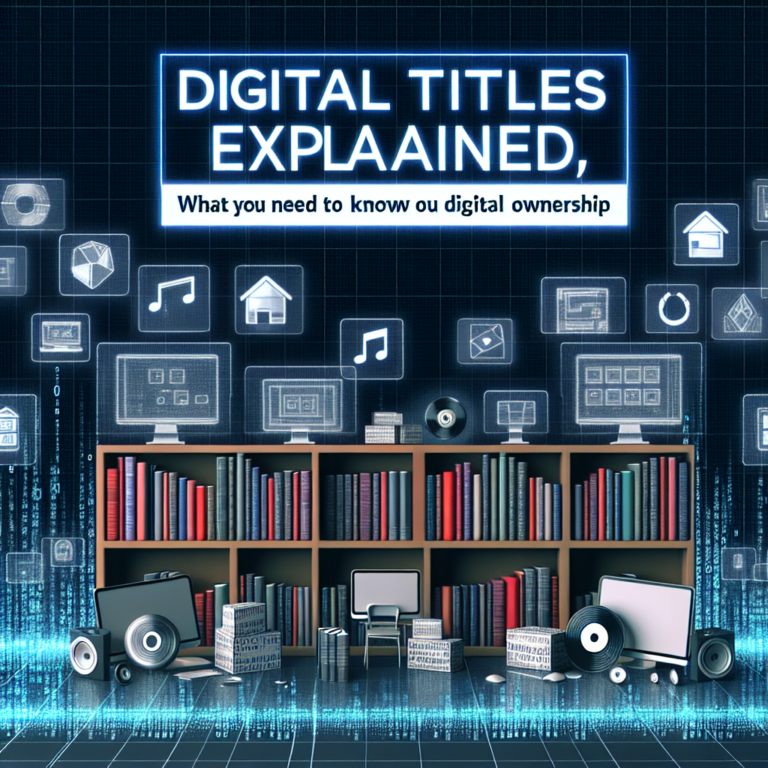In today’s increasingly digital world, the concept of ownership has transformed significantly. With the rise of digital assets, the way we understand ownership — once rooted firmly in physical property — now overlaps with the emerging realm of virtual goods. Digital titles, an essential component of this evolution, represent a new form of ownership that comes with various implications and considerations. This article aims to demystify digital titles by exploring what they are, how they work, and what you need to know about digital ownership.
What Are Digital Titles?
Digital titles are essentially certificates of ownership for digital assets. Just as a car title proves ownership of a vehicle, a digital title serves as proof of ownership for virtual items, such as cryptocurrencies, domain names, Non-Fungible Tokens (NFTs), software licenses, and digital media like eBooks and music. A digital title can be represented in various forms, depending on the asset it corresponds to and the technology used to secure it.
In many cases, especially with NFTs and blockchain-based assets, digital titles are stored on a decentralized ledger, ensuring transparency and security. This ledger not only records ownership but can also include information about provenance, authenticity, and transaction history.
The Rise of Digital Ownership
The shift towards digital ownership has accelerated in recent years, driven by technological advancements and changing consumer behaviors. The advent of blockchain technology has played a pivotal role by offering a secure and decentralized way to verify ownership and transfer assets. This has led to the emergence of a variety of digital titles used in different contexts:
-
Cryptocurrencies: Assets like Bitcoin and Ethereum are built on blockchain technology, with ownership denoted by digital keys.
-
NFTs: These unique digital tokens represent ownership of digital art, music, collectibles, and virtual real estate. Each NFT has its own digital title stored on the blockchain, which confirms the identity of the owner and the authenticity of the asset.
- Digital Goods: Software licenses, eBooks, and subscription services often come with licenses that serve as digital titles. They define the terms of use and outline what users can and cannot do with the content.
Implications of Digital Ownership
Understanding digital ownership and titles comes with various implications:
1. Rights and Responsibilities
Owning a digital title often comes with rights and responsibilities. For example, in the case of NFTs, while owners have the right to sell their tokens, they may not have the right to reproduce the underlying artwork unless specified. Understanding these details is crucial to leveraging digital assets successfully.
2. Copyright and Intellectual Property
Digital ownership is intimately connected with copyright laws and intellectual property (IP) rights. As digital ownership expands, so too does the challenge of enforcing IP rights. Clear distinctions need to be made about what ownership entails — especially when it comes to digital art and media, where reproducing an asset without permission can infringe upon an artist’s rights.
3. Digital Custodianship
The responsibility of safeguarding digital titles often falls on the owner. Unlike physical assets protected by banks or vaults, digital assets can be susceptible to theft and loss if not adequately secured. Understanding proper custodianship through wallets, backed-up private keys, and the use of trusted marketplaces is critical.
4. Market Valuation
The value of digital assets can fluctuate significantly based on demand, rarity, and market trends. Digital titles often come with a degree of speculation, making informed decision-making essential before purchasing or investing in digital assets.
5. Regulatory Considerations
As governments and regulatory bodies begin to craft legislation around digital assets, understanding the legal framework governing digital titles will become increasingly important. Issues related to taxation, anti-money laundering (AML) regulations, and consumer protection are already under scrutiny.
Conclusion
Digital titles represent a fundamental shift in how we perceive ownership in the digital age. As this concept continues to evolve, so will the complexities and opportunities surrounding digital assets. Whether you’re an individual exploring the world of NFTs, cryptocurrency enthusiasts, or businesses investing in digital goods, understanding digital titles is essential to navigate this rapidly changing landscape effectively. Knowledge is power, and being informed not only protects your digital investments but empowers you to make the most of the digital ownership revolution.


